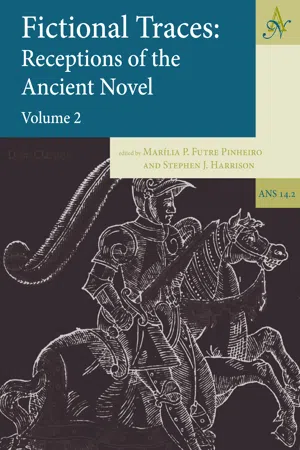
Fictional Traces
Receptions of the Ancient Novel - Volume 2
- 211 pages
- English
- PDF
- Available on iOS & Android
Fictional Traces
Receptions of the Ancient Novel - Volume 2
About This Book
The study of the reception of the ancient novel and of its literary and cultural heritage is one of the most appealing issues in the story of this literary genre. In no other genre has the vitality of classical tradition manifested itself in such a lasting and versatile manner as in the novel. However, this unifying, centripetal quality also worked in an opposite direction, spreading to and contaminating future literatures. Over the centuries, from Antiquity to the present time there have been many authors who drew inspiration from the Greek and Roman novels or used them as models, from Cervantes to Shakespeare, Sydney or Racine, not to mention the profound influence these texts exercised on, for instance, sixteenth-to eighteenth-century Italian, Portuguese and Spanish literature. Volume I is divided into sections that follow a chronological order, while Volume II deals with the reception of the ancient novel in literature and art. The first volume brings together an international group of scholars whose main aim is to analyse the survival of the ancient novel in the ancient world and in the Middle Ages, in the Renaissance, in the 17th and 18th centuries, and in the modern era. The contributors to the second volume have undertaken the task of discussing the survival of the ancient novel in the visual arts, in literature and in the performative arts. The papers assembled in these two volumes on reception are at the forefront of scholarship in the field and will stimulate scholarly research on the ancient novel and its influence over the centuries up to modern times, thus enriching not only Classics but also modern languages and literatures, cultural history, literary theory and comparative literature.
Frequently asked questions
Information
Table of contents
- Cover
- Editors’ Introduction
- Charikleia at the Mauritshuis
- Susanna and her Sisters
- Martianus Capella’s De nuptiis Philologiaeet Mercurii or the Subversion of the Latin Novel
- Apuleius, Beroaldo and the Developmentof the (Early) Modern Classical Commentary
- The Golden Ass and its Nachleben in the Middle Ages and in the Renaissance
- From word to image: notes on the Renaissance reception of Apuleius’s Metamorphoses
- Love on a wallpaper: Apuleius in the boudoir
- Petronius in West Egg: The Satyricon and The Great Gatsby
- ‘His Career as Trimalchio’: Petronian Characterand Narrative in Fitzgerald’s Great American Novel
- Petronius and the Contemporary Novel: Between New Picaresque and Queer Aesthetics
- Psyche, Callirhoë and Operatic Heroines Derived from Ancient Novels
- Le dieu Pan fait pan pan pan de son pied de chèvre: Daphnis and Chloe on the stage at the end of the nineteenth century
- Widows on the operatic stage: The ‘Ephesian Matron’ as a dramatic character in wdtwentieth-century German musical theatre (esp. 1928-1952)
- Apuleius On the Radio: Louis MacNeice’s BBC Dramatisations
- Abstracts
- Contributors
- Indices